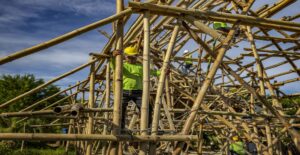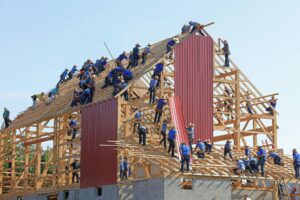Environmentally sustainable construction in Philippines’ social housing sector
The document titled “Environmentally Sustainable Construction in the Philippines’ Social Housing Sector” discusses the pressing need for sustainable building practices within the context of social housing in the Philippines. It highlights the significant role that environmentally sustainable construction can play in addressing housing shortages, improving living conditions, and mitigating climate change impacts.
Context and Challenges
The Philippines faces a critical housing crisis, exacerbated by rapid urbanization and a growing population. Many low-income families live in informal settlements with inadequate infrastructure and services. The construction sector, responsible for a substantial share of global energy consumption and waste generation, must adopt more sustainable practices to reduce its environmental footprint. Traditional construction methods often rely on materials that are resource-intensive and contribute to greenhouse gas emissions.The document emphasizes that integrating sustainable building materials and practices into social housing projects can lead to improved resilience against climate-related disasters, which are increasingly common in the region.
Sustainable Construction Practices
The document outlines several environmentally sustainable construction practices that can be implemented in the social housing sector:
1. Use of Eco-Friendly Materials
The adoption of eco-friendly materials is crucial for reducing the environmental impact of construction. The Philippines Green Building Council has promoted materials such as modified Concrete Hollow Blocks (mCHB) made from recyclable materials, including PET plastic, and soil erosion nets made from coconut fiber (coco coir). These materials not only reduce waste but also enhance the durability of structures.
2. Green Building Certifications
The introduction of green building certification systems, such as “Building for Ecologically Responsive Design through Excellence” (BERDE), encourages developers to incorporate sustainable practices into their projects. These certifications provide guidelines for energy efficiency, resource conservation, and overall environmental performance.
3. Community-Based Training Programs
Training programs aimed at local communities are essential for promoting sustainable construction practices. The document details a three-tiered training approach that includes:
- Basic Skills Training: Community members receive on-the-job training in producing eco-friendly materials like mCHB and coco coir nets.
- Advanced Skills Development: Multi-skilling initiatives through partnerships with educational institutions enhance workers’ capabilities in green masonry techniques.
- Professional Development: Training for architects and developers focuses on integrating green standards into design and construction processes.
These programs not only empower communities but also create job opportunities within the green economy.

Policy Framework
The document outlines existing national policies that support environmentally sustainable construction in the social housing sector:
- National Climate Change Action Plan: This plan emphasizes climate-adaptive housing and infrastructure.
- Philippines Development Plan: Recognizes decent and affordable housing as vital for inclusive growth.
- National Labour and Employment Plan: Identifies social housing as a sector for generating decent work opportunities.
These frameworks guide efforts to promote sustainability in construction while addressing social equity.
Economic Benefits
Investing in sustainable construction practices can lead to long-term economic benefits. By reducing energy consumption and operational costs, eco-friendly buildings can provide financial savings for low-income families. Additionally, green construction can stimulate local economies by creating jobs in material production and skilled labor.
Conclusion
In conclusion, the document asserts that integrating environmentally sustainable construction practices into the Philippines’ social housing sector is essential for addressing the dual challenges of housing shortages and climate change. By adopting eco-friendly materials, promoting community training programs, and implementing supportive policies, stakeholders can create resilient housing solutions that benefit both people and the planet. The shift towards sustainable construction not only enhances living conditions for low-income families but also contributes to broader environmental goals. As the Philippines continues to grapple with urbanization and climate-related challenges, embracing sustainability in building practices will be crucial for fostering a more equitable and resilient future. The commitment to environmentally friendly construction represents a significant step towards achieving these objectives while ensuring that all Filipinos have access to safe and sustainable housing.
More reading: Sustainable Low-Cost Housing: New Technology and Attitudes – The Importance of Creating Awareness
The Transition to Environment-Friendly Materials in … billionbricks
The Demand For Sustainable Construction In The Philippines
